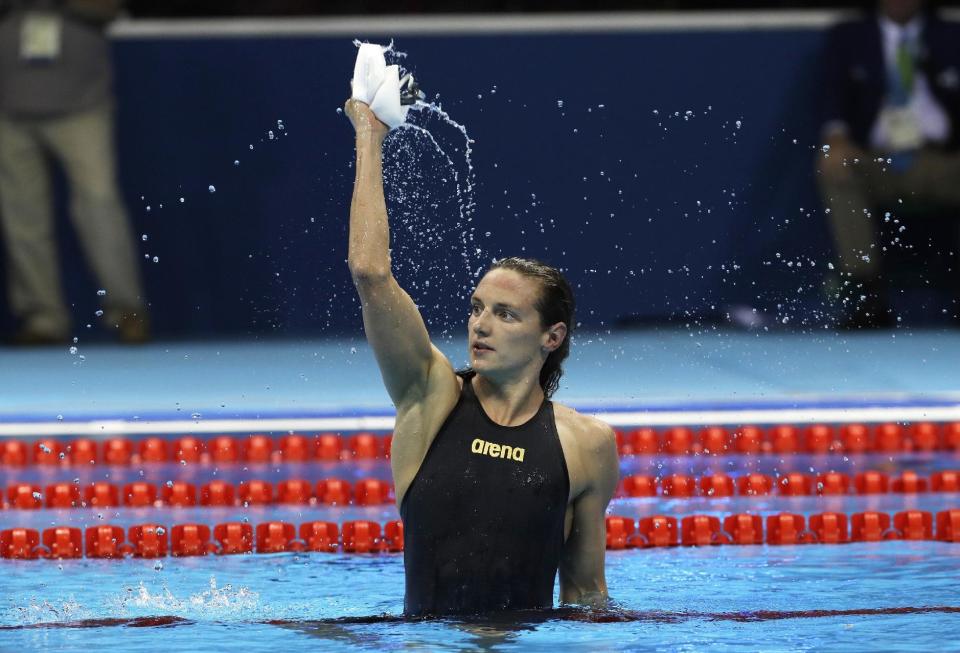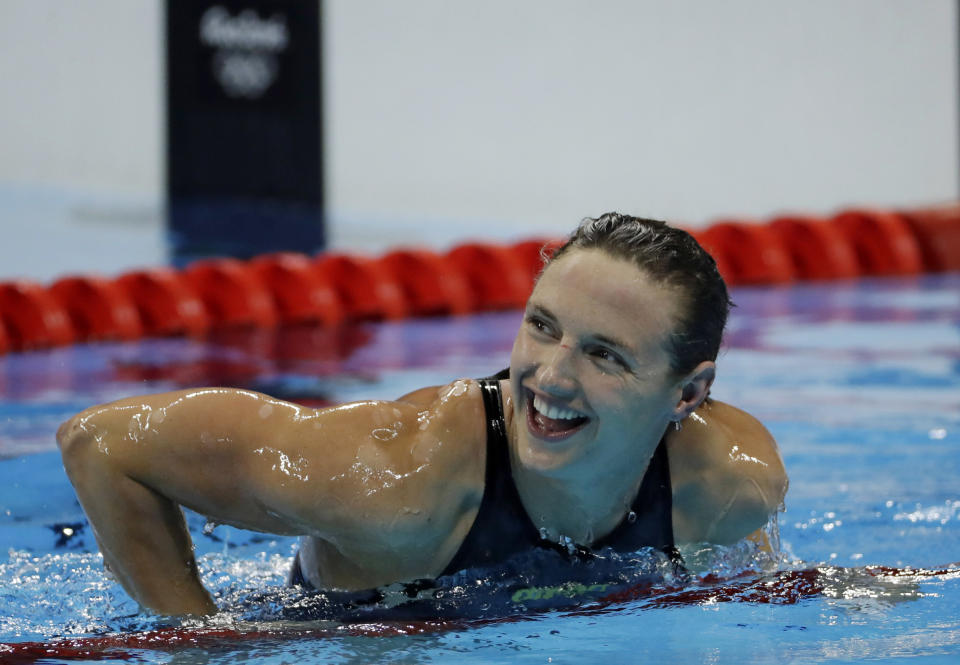The Iron Lady, a lawsuit and the destruction of a world record
RIO DE JANEIRO – The numbers kept rising.
After 50 meters it was more than half a second, and after 100 meters it was 1.28 seconds, and after 150 meters it was 2.52 seconds, and after 200 meters it was 3.34 seconds, and after 250 meters it was 4.91 seconds, and after 300 meters it was 5.25 seconds, and at that point, when the Iron Lady led the Rio Games’ women’s 400-meter individual medley like Secretariat at the Belmont, when the difference between her splits and the world record bordered on absurd, I thought about the lawsuit.
It was filed Nov. 12, 2015, in district court in Arizona, and the second page lays bare what compelled Katinka Hosszu – the most successful swimmer in the world today, the woman with the stamina that warrants her nickname of ferrum – to take civil action against a swimming journalist and his publication: “Claiming that she is taking performance enhancing drugs, and therefore cheating, as the explanation for her remarkable success over the last three years in vigorous competition around the globe.”

The next five words of the suit are important: “The defendants’ accusations are false.” On a night like Saturday, when the Olympic Aquatics Stadium here opened its doors for the first time and saw Hosszu eventually destroy the world record by more than two seconds, the swimming world prayed those five words were true, too. Because in a sport so marred by doping, in an Olympic movement similarly tarnished, the story of a Hungarian girl who shook off the lowest moment of her life at the Olympics four years earlier to rise up and not only embrace the moment but consume it whole certainly beats the alternative.
When she touched the final wall, Hosszu had swam the 400 meters in 4:26.36, a full 2.07 seconds better than Ye Shiwen’s record at the London Games, which itself has attained dubious status in the swimming world because of her 58.68-second final 100-meter freestyle swim – just .03 seconds slower than that of 2012 men’s gold medalist Ryan Lochte.
“Honestly, I didn’t think I could go this much faster,” Hosszu said, “but it’s just unbelievable I’ve been able to break it by this much.”
And that about sums it up.
The 400 IM had something of a notorious history before Ye and Hosszu’s world records. In 1982, Petra Schneider broke her own all-time mark, swimming a 4:36.10, which stood for more than 15 years. Schneider later admitted using PEDs, one of the few East Germans who came clean about the state-sponsored doping program. She asked her time be struck from the German record books.
Slowly, the record dwindled, usually by fractions of a second, occasionally by a second-plus. Never anything like Hosszu did Saturday night. She entered the race an overwhelming favorite, the field playing for silver. As Hosszu stood next to the starting block, she slapped the front of the legs, then the sides. She splashed some water across her chest and adjusted her goggles. She slapped her legs again, clapped, stretched, slapped again, slapped once more and then dove in for the swim of her life.

It came four years after the worst. At the London Games, Hosszu was similarly favored. She finished fourth. It was her third Olympics, and she hadn’t won a single medal. Hosszu asked her former USC teammate and now-husband Shane Tusup to start coaching her, and her accolades piled up. World Swimmer of the Year in 2014 and 2015. World-record holder in every IM distance as well as the 100- and 200-meter backstroke. She has a legitimate shot at five gold medals, with the 100 and 200 back, the 200 IM and the 200-meter butterfly left to race. Only Kristin Otto, an East German doper, has won more than four golds in a single Olympics.
All the winning paid Hosszu more than $1 million in earnings – and, at the same time, cost her reputation. The lawsuit against writer Casey Barrett and Swimming World Magazine stemmed from a commentary that included the provocative headline: “Are Katinka Hosszu’s Performances Being Aided?” Barrett, a former Olympic swimmer for Canada, argued that doping scandals persisted in part because of journalists’ unwillingness to call out users. Never did he call Hosszu a doper. It was more of a not-sayin’, just-sayin’ drive-by.
[Photos: Nine facts you need to know about Katinka Hosszu]
Barrett, essentially, brought to the public the hushed whispers that pervade elite-level pools everywhere. There is no evidence Hosszu has used any PEDs, which makes any accusation as such dangerous. Depositions are scheduled to be taken sometime after the Olympics, and Hosszu, Tusup and others likely will be questioned under oath. The sides are expected to talk about a settlement sometime in 2017.
Until then, Hosszu will keep swimming and presumably keep breaking records that stupefy the competition. American Maya DiRado, who won the silver, finished nearly five seconds behind Hosszu and admitted the number 4:26 left her awestruck. Same went for Elizabeth Beisel, the silver medalist in 2012 who finished sixth Saturday.
“Four twenty-six,” Beisel said. “That’s going to be hard to touch for a very long time.”
Not if Hosszu has anything to do with it.
“I’m already thinking how I can get faster,” she said. “I definitely want to, want to get faster, and I think I can.”
Four twenty-six, impossible a generation ago, unfathomable even today, is for the Iron Lady not even a peak. Just another number to make fall.
More Olympic coverage from Yahoo Sports:

